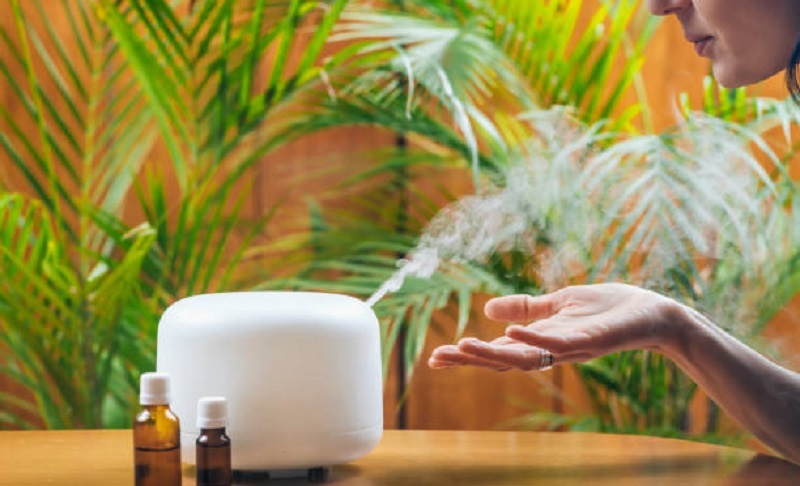Proper humidity in your home is important for your health and comfort, which is where diffusers and humidifiers come in handy. However, owning several appliances for controlling humidity can be confusing, not to mention expensive. It is, therefore, not surprising that many homeowners wonder whether they can use a diffuser as a humidifier.
Diffusers and humidifiers work very similarly. They both release particles in the air – one being water and the other essential oils mixed with water. While they are defined for different purposes, they both help to control the humidity. You can, therefore, use a diffuser as a humidifier.

Below, we are going to take a look at the working of each of these appliances in detail. We will also delve into whether it is practical to use a diffuser as a humidifier, instead of running both appliances.
Contents
Diffuser vs humidifier – what’s the difference?
While they have a similar operating mechanism, there are a few differences between them. Let’s take a look at each of the appliances to understand them.
Humidifiers are designed to control humidity by adding moisture to the air. This helps to prevent dryness, which can cause irritation on the skin, lips sinuses, or even irritation on various body parts (throat). Since they are meant to add moisture, they are usually large in size, to accommodate the water reservoir.
By releasing moisture into the air, humidifiers offer several health benefits. They include:
- Preventing colds and flu
- Alleviating nasal congestion
- Alleviating symptoms of flu and colds
- Moisturizing the hair and preventing itchy scalp
- Preventing dry skin
Diffusers, on the other hand, are appliances that spread microdroplets of essential oils in the air. For this reason, they are commonly referred to as essential oil diffusers.
The way the diffusers work is that the essential oils are mixed with water in the reservoir. They are then broken down into small molecules and then diffused into the air as a mist.
However, since diffusers are not designed for humidity, the water reservoir is usually small in size. Therefore, they don’t add as much moisture to the air as a humidifier.
Essential oils used in the diffuser have a great aroma, which is released into the air. They also offer several other benefits such as:
- Providing a relaxing atmosphere
- Alleviating stress
- Improving sleep
- Some oils have anti-microbial properties that kill germs, bacteria, and viruses in the air
- Reinvigorating your brain and body, and more.
Can a diffuser work as a humidifier?
While a diffuser is mainly designed to spread essential oils, it also releases moisture into the air. Therefore, you can use it in your home as a humidifier.
However, using a diffuser as a humidifier does come with several challenges. They include:
1. It does not release much moisture into the air
You can only use a diffuser as a mini-humidifier. Therefore, it will only be effective in relatively smaller spaces, which don’t require too much moisture addition.
2. Releasing too many essential oils in the air
Since the moisture released is not much, you might have to run it longer than would be necessary. As a result, you can end up with too much essential oil in the air, which can be an issue if you are sensitive to scents.
However, it is possible to overcome this challenge by removing the essential oils from the equation. But can you use a diffuser with just water? Since the oils are mixed with the water then dissipated, it is perfectly safe to use the diffuser without oil. This way, it will only release water mist, thus increasing the humidity.
Diffuser FAQs
Looking to know more about how you can use a diffuser at home? Below is a look at some frequently asked questions and answers when it comes to this appliance.
1. Can a diffuser be used as a humidifier for plants?
When looking to use a diffuser as a plant humidifier, there are two factors to consider: safety and effectiveness.
For safety, most essential oils won’t harm your plants; since some of them are plant extracts. They can even benefit them by getting rid of pests and other microbes. However, some can be dangerous, especially if they contain chemical additives. Too much essential oils can also clog leaves pore of the plants, thus interfering with their growth.
Now, for effectiveness, diffusers don’t release as much moisture as humidifiers. And since plants require specific humidity ranges for proper growth, you might have to run them for extended periods.
Therefore, while it is possible to use a diffuser for your plants, a humidifier might be a better option overall.
2. Will a diffuser help with dry air?
Yes, it can. The diffuser will release moisture in the air, which will help to moisturize it. On top of that, some of the essential oils used in diffusers are also very beneficial for hair growth.
Summary
Using both a diffuser and a humidifier can improve air quality greatly, but it can also be expensive to purchase both. On top of that, running both appliances at the same time can add up the energy bills.
Thankfully, both appliances have a similar mechanism. Therefore, it is possible to use your diffuser as a humidifier. However, this will only be in a limited capacity – mostly so in small spaces that don’t require much humidity adjustment.
Read Also
